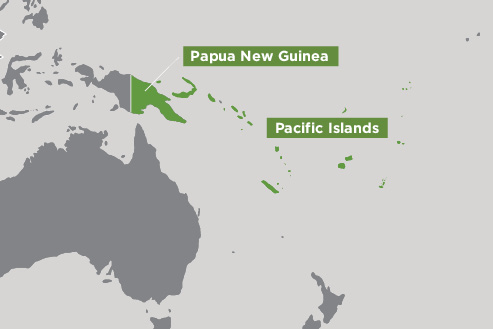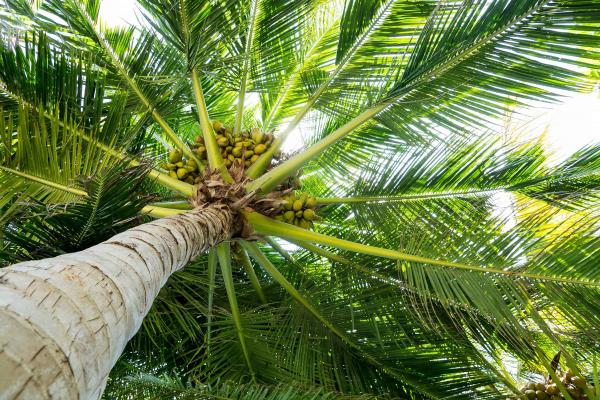Overview
This project aims to support the rejuvenation of coconut-based livelihoods in the Pacific islands by strengthening the conservation and utilisation of coconut diversity and by addressing biotic threats to coconut diversity in the region
Coconuts contribute, directly or indirectly, to the livelihoods of coastal communities throughout the Pacific islands, comprising some five million vulnerable people. Dependence on coconuts, however, has become a ‘poverty trap’ for communities with few other livelihood options due to a number of factors including falling prices, ageing tress becoming less productive as well as several urgent biotic threats.
Conserving and redeploying coconut diversity can provide the foundation for improving coconut-based industries that support livelihoods in the Pacific islands and, ensuring their resilience in the face of climate change and other challenges.
The focus of the project's activities is to establish a platform for regional coordination of research and development efforts to develop a more robust and viable coconut sector which will be able to respond to national, regional and global market needs.
Expected project outcomes
- Developing and deploying strategies for coconut conservation and use.
- Developing and deploying strategies for addressing biotic threats to coconut.
- Establishing and sustaining a platform for coordinating coconut research-for-development initiatives.
Summary of outcomes to date
2021-22
- Two collection trips were made in Fiji to acquire coconut germplasm for conservation and cryopreservation research at the Pacific Community (SPC)-Centre for Pacific Crops & Trees (CePaCT) and for the collaborating partner, University of Queensland (UQ). Over 2000 coconuts of eight different varieties growing in Fiji were collected and processed for research at CePaCT and 714 viable embryos arrived in Australia for UQ research. In addition to sourcing coconut germplasm from Fiji, UQ has also sourced explant tissues from India, Vietnam, China, and Indonesia. This was due to shortfalls in supply from Fiji and other country partners.
- Research at UQ has progressed with improvements in the efficiency of the in vitro processes of embryo culture, somatic embryogenesis, cryopreservation in addition to genetic fidelity testing of tissue cultured plants. Obtaining adequate supplies of coconut explants for research will be a priority moving forward.
- CePaCT successfully germinated zygotic embryos from Fijian varieties, and these are growing in vitro. Experiments on pre-treatment of coconut zygotic embryos and meristems were successfully implemented and these experiments will be continued in collaboration with UQ to assist in optimisation of the cryopreservation and tissue culture protocols for both coconut embryos and meristems.
- Research at UQ has made progress in several aspects of coconut plantlet acclimatisation with improvements being made with using improved LED lighting systems and with the enhancement of plant vigour and growth with CO2. Further experiments on optimizing media for acclimatisation will provide further refinements in the protocols which will improve the success of transfer of plantlets to the field and shorten the time to do this. In addition, research on the use of different forms of culture systems for the rapid multiplication of coconut plantlets has identified several variables that improve plantlet production and formation in the somatic embryogenesis (SE) pathway.
- A temporary immersion system has been optimised for the biological density of tissue to be used, the time for the temporary immersion stage and the photoperiod to be used. Some adjustments were required and implemented, specifically concerning obtaining research materials, but also about training and capacity-building.
- Work has started on the preparation of several training aids, including video training modules, protocol manuals and online presentations. Although satisfactory as an interim measure, online training alone will not be sufficient to provide partners with a full understanding of the techniques involved in coconut In vitro biology, and hands-on-training would still need to be delivered in year-2 and/or year-3, after travel restrictions have been lifted. To move along more rapidly with the preparation of the training aids, appropriate budget variations were proposed and acted on, appointing Dr Adkins on an ACIAR-funded P/T position for 6 months from June 1, 2021, to help work on the development of the training aids.
- Video training aids for the extraction of coconut embryos and shipment of cultures are also underway at CePaCT to complement the materials being produced by UQ.
2022-23
- Four rooted plantlets established from cryopreserved coconut meristems were planted in the field in Indonesia through the work of UQ postgraduate student Amir Bazrafshan; this may be the first report of successfully established field plantings of cryopreserved plantlets.
- Three postgraduate students (1 x MSc and 2 x PhD) at UQ graduated during this reporting period and their research contributed to the outcomes under Objective 1 of this project.
- The first genotyping study on Pacific coconut varieties was completed in Fiji through an associated student project supported under the ACIAR PASS Scholarship programme at the University of the South Pacific; the student has now completed studies and an MSc. thesis has been prepared and submitted for examination; the project lead provided co-supervision of the USP-based student and, a of the field work for the student was supported by project personnel and partners Fiji Ministry of Agriculture.
- All country partners have made progress on the identification and characterization of local coconut populations and have implemented prospecting missions for new ecotypes or varieties and this work will continue in the next reporting period.
- Good recoveries (73%) of coconut zygotic embryos of Pacific varieties were observed following dehydration as part of the cryopreservation protocol developed by UQ; although this research will need to be repeated and replicated and a cryopreservation step included before full assessment, the level of recoveries are encouraging and demonstrate the suitability of cryopreservation of coconut embryos as a means to conserve for Pacific coconut varieties in the longer term.
- Coconut plantlets were acclimatized at CePaCT following embryo culture for 8 months and are in the pre-nursery ready to be hardened in an open nursery once clearance is received to release the seedlings by biosecurity authorities.
- Successful training events including virtual (UQ) and in-country (SPC) training sessions were also held covering coconut tissue culture, zygotic embryo extraction and field characterization; The training session held on-site for CePaCT staff by UQ project personnel was delivered through a two-week attachment in February 2023; the training included media preparation for embryo culture, somatic embryogenesis and pre-cryopreservation dehydration protocols, in addition, the procedures for the initiation steps for somatic embryogenesis of coconut were transferred and further steps to promote root formation of plantlets will be made available in 2023; other aspects of the training included the ex-vitro acclimatization of embryo-cultured Pacific materials growing in vitro at CePaCT.





